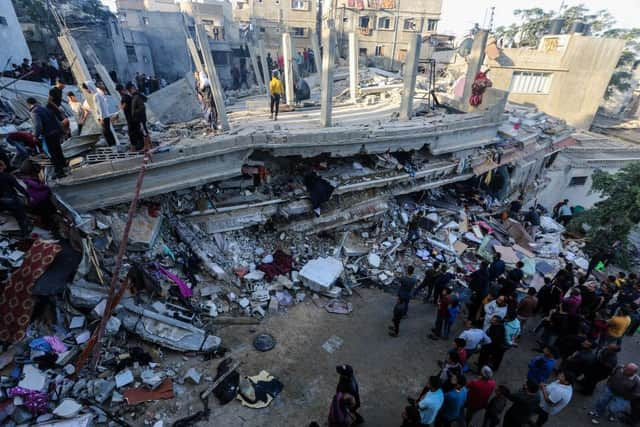Israel-Hamas war: Hamas leaders say they attacked Israel ‘to change the equation’ in the Middle East
Hamas attacked Israel "to change the equation" in the Middle East, its leaders have claimed, in a series of interviews with the New York Times.
Leaders who have spoken to the US newspaper say the attacks on October 7 were necessary to “change the entire equation and not just have a clash”, despite the resulting carnage, which has seen more than 10,000 Gazans killed, Khalil al-Hayya, a member of Hamas’s top leadership body, said.
Advertisement
Hide AdAdvertisement
Hide Ad“We succeeded in putting the Palestinian issue back on the table, and now no one in the region is experiencing calm,” he said, speaking in Qatar.


“What could change the equation was a great act, and without a doubt, it was known that the reaction to this great act would be big. We had to tell people that the Palestinian cause would not die.”
It is a month since the shocking and deadly attacks in which more than 1,000 Israelis were killed, many of them massacred in their homes in kibbutz close to the border with Gaza. Israel responded with heavy air strikes, which have devastated Gaza, as well as putting the territory under siege, leaving citizens without access to food, clean water or fuel.
Earlier this week, Israeli leader Benjamin Netanyahu claimed after the war, Israel would oversee Gaza, saying “we’ve seen what happens when we don’t have it [security responsibility]”.
In weeks of interviews with the New York Times, Hamas leaders, along with Arab, Israeli and Western officials who track the group, said the attack had been planned and executed by a tight circle of commanders in Gaza who did not share the details with their own political representatives abroad or with their regional allies such as Hezbollah in Lebanon.
“I hope that the state of war with Israel will become permanent on all the borders, and that the Arab world will stand with us,” said Taher El-Nounou, a Hamas media adviser.
The newspaper also interviewed Israeli officials, one of whom said the misjudgement of Hamas’ intentions – and the ensuing security failures which allowed Hamas to breach Israel’s borders to carry out the attacks – would haunt him forever.
“I will carry the burden of this mistake for the rest of my life,” one official said in an interview with the New York Times.
Advertisement
Hide AdAdvertisement
Hide AdHamas emerged in the late 1980s – officially coming into existence in 1987 – as a response to the Israeli occupation of Palestinian territories, particularly the Gaza Strip and the West Bank. It was founded by Sheikh Ahmed Yassin, a Palestinian cleric, and initially gained support from various quarters, including Palestinian civilians frustrated with the lack of progress in the peace process.
Hamas stands in elections in Palestine and took power in January 2006, beating the Fatah party, who are affiliated with the Palestine Liberation Organisation (PLO). Under Yasser Arafat, and after the 1967 Arab-Israeli War, Fatah, led by Mahmoud Abbas, became the dominant party in the PLO. Mr Abbas is president of the Palestinian Authority, which controls the West Bank.
Comments
Want to join the conversation? Please or to comment on this article.
